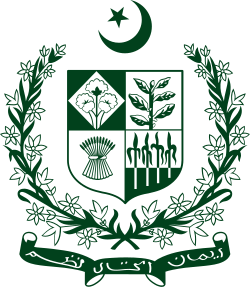Top Qs
Timeline
Chat
Perspective
Cabinet of Pakistan
Formal body of the Government of Pakistan From Wikipedia, the free encyclopedia
Remove ads
The Cabinet of Pakistan (Urdu: کابینہِ پاکستان, Kābīnā-e-Pākistān) is a formal body composed of senior government officials chosen and led by the Prime Minister.[1] All cabinet members sworn in are designated Minister and are seated at their respective ministries located in the Pakistan Secretariat.
The Cabinet Secretary of Pakistan serves as the administrative head of the Cabinet Division and reports directly to the Prime Minister.[2] According to the Constitution of Pakistan, the Prime Minister may dismiss members of the cabinet, but must do so in writing, and new appointees must again be approved by the Parliament. The cabinet meets weekly in Islamabad. The cabinet is granted constitutional power under Article 81D of the Constitution of Pakistan.[3] The existence of the cabinet dates back to Prime Minister Liaqat Ali Khan, who appointed civil servants and statesmen to his first cabinet. On 10 April 2022, Shehbaz Sharif's ministry was formed after Sharif was elected as prime minister by the National Assembly of Pakistan.[4][5]
Remove ads
Current cabinet
Summarize
Perspective
Federal ministers
Ministers Of State
Adviser to the prime minister
Special assistant to the prime minister
Coordinator to the prime minister
Cabinet division and cabinet secretariat
The current Federal Secretary of the Cabinet is Kamran Ali Afzal, since his appointment in August 2023.[13] On 20 March the National Seed Development and Regulatory Authority (NSDRA) and Cannabis Control and Regulatory Authority were both placed under the administrative control of the Cabinet Division.[14][15] The Cabinet Secretariat is directly under the Prime Minister and Cabinet Secretary, controlling the Aviation Division, Cabinet Division, Establishment Division, National Security Division and Poverty Alleviation & Social Safety Division.[16]
Cabinet committees
On 21 March the cabinet division would issue two separate notifications constituting the Economic Coordination Committee (ECC) and the Cabinet Committee on Energy (CCoE), by the Prime Minister under terms of rule 17(2) of Rules of Business, 1973. Both would be retained directly under Shehbaz Sharif, becoming Chairman of both committees.[17][18] On the same day Shehbaz would also approve the reconstitution of the Cabinet Committee on Privatization (CCoP), with MoFA Ishaq Dar as Chairman with the secretarial support of the Committee provided by the Aviation Division; and the reconstitution of the Cabinet Committee on State-Owned Enterprises (CCoSOEs), with Minister of Finance and Revenue, Muhammad Aurangzeb as Chairman.[19][20] Additional Committees constituted on 21 March include the Cabinet Committee on Disposal of Legislative Cases (CCLC) under Azam Nazeer Tarar, the Cabinet Committee on Chinese Investment Projects (CCoCIP) under Ahsan Iqbal, and a committee to "speed up" the privatization of Pakistan International Airways (PIA) under Khawaja Asif.[21] With forty-eight hours, on 23 March the Cabinet Division issued a notification, appointing Muhammad Aurangzeb as new Chairman of the ECC, with Shehbaz Sharif withdrawing from the committee[22] Previously Aurangzeb held chairmanship of only the Cabinet Committee on SOEs (CCoSOEs), while Ishaq Dar also held a prominent role in the new cabinet committees as chairman of Cabinet Committee on Privatisation (CCoP).[23] This was a departure from past practices, where finance ministers chaired three out of four committees.[24] With Shahbaz Rana writing that the "PM had "clipped" the Finance Minister’s "decision-making wings" by depriving him of the ECC.[25] The decision to place Aurangzeb as chairman also came after criticism from "all quarters."[24] Pakistan newspaper Dawn, quoting a senior member of the cabinet officially stated that the PM had “regretted he would be unable to chair the ECC meetings due to his hectic schedule and engagements.”[26] On 28 March the Cabinet Committee on Inter-Governmental Commercial Transactions (CCoIGCT) would be constituted, chaired by Khawaja Asif, with Terms of Reference (ToR) that the committee may authorize, recommend approval, and constitute a negotiation committee for a G2G or commercial agreement with a foreign state, as well as approve price-discovery mechanisms, submit recommendations for existing regulatory compliance. Operating under the clauses (c) and (d) of sub-section (2) of Section (4) of the Inter-Governmental Commercial Transactions Act, 2022.[27]
Remove ads
References
Wikiwand - on
Seamless Wikipedia browsing. On steroids.
Remove ads

